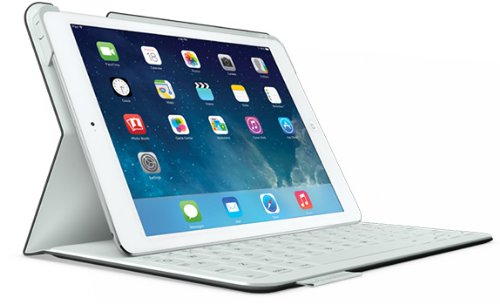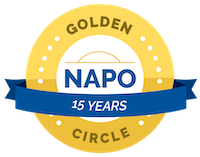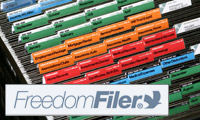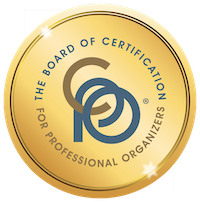Fast Company: 6 Simple Habits That Can Save You Hours
I’m thrilled to be one of three productivity experts interviewed for a story on FastCompany.com call 6 Simple Habits That Can Save You Hours.

The article, which was written by Stephanie Vozza published today, provides six great tips for beneficial habits. I always like being in great company: the other experts quoted are professional organizer Julie Morgenstern, author of Never Check Email in the Morning and Emily Schwartz, author of The Time Diet: Digestible Time Management.
I urge you to check it out!
Decluttering Step #2: Choose your space

This is the second in a series of blog posts I’m writing on Mondays that will take you step by step through the decluttering process. Each Monday for the next few weeks, I’ll offer a new step. If you missed Step #1, Create your vision, be sure and check it out.
Once you’ve created your vision for your decluttered space, the next step is to decide what space to declutter first.
If you’re dealing with a lot of clutter, you’re probably feeling overwhelmed. People often tell me they just don’t know where to start.
So here are a few guidelines that should make it easier.
- Choose a storage space. You might be tempted to start with clutter that’s out in the open. But that stuff is typically the stuff you’re actually using. Instead, start with the storage areas, like cupboards and drawers. They’re frequently full of stuff you haven’t used in awhile, which makes it easier to let stuff go. And by doing so, you’ll be making room to store the stuff you actually use.
- Start small. Set yourself up for success by choosing a single drawer or a single shelf. Keep this first project tiny.
- Make it a high-impact area. Start with a drawer you use every day that’s hard to open because it’s too full, if you can. Or a shelf in a cupboard you open daily. It will feel so much better when you use it and that will spur you on for more projects.
Large projects feel much less overwhelming when you break them down into small pieces. If you view your decluttering projects in terms of small individual tasks, you take away their power to overwhelm you. Use the three criteria described above and you’ll be ready to get started when we’ve completed this little series.
Traveling light, thanks to my iPad
I bought an iPad Air on December 26. If you’ve been reading this blog a long time, you might remember that I was an early adopter of the iPad. I bought the original version in 2010 and fell head over heels in love with it.
But when I got my iPhone 4S in 2012, the iPad seemed slow and heavy by comparison. It ended up being a paper weight and I sold it it to Gazelle for $100.
Last month, I decided to bite the bullet and get an iPad Air. I thought it would be useful in my genealogy research and my aging eyes were yearning for a larger, portable device on which to surf the net while away from my desk.
I was in Portland last week and, naturally, took my new iPad. It turned out that for some reason I couldn’t send email from where I was staying, so I had to send all my email from the iPad. That prompted me to go to Best Buy and get a Logitech FabricSkin iPad case, which I absolutely love.

When I was flying home yesterday, I got to thinking about how I didn’t use anything on the plane beyond my iPad and a spiral bound notebook. The plane had wi-fi, so I was able to access my task manager and other resources on Springpad. I could read my library book via the Kindle app. I have a KenKen app, which kept me amused. And I had downloaded a movie on iTunes, Blue Jasmine. (Wow—what amazing performances.)
Back in the day, I’d lug along all sorts of books, files, a laptop, a DVD, and notebooks so that I could work and stay happy on an airplane. (To be fair, I did have my laptop with me, because I needed it in Portland; I just never took it out of my bag once I left for the airport.) With my iPad, my on-plane life is much less complicated!
Decluttering Step #1: Create your vision

This is the first part in a series I’m writing that will take you step by step through the process of decluttering. Each Monday for the next few weeks, I’ll offer a new step. Today we start with the first step, creating your vision.
When it’s time to declutter and get organized, is your first inclination to go to the Container Store or Target and buy organizing solutions? I understand that inclination. Buying that stuff can be really fun.
But that’s actually not a good first step. Purchasing organizing or storage solutions might become necessary, but the very first step when you’re starting the process of decluttering and getting organized is to create your vision for your space.
By creating your vision, you know what you’re moving toward. Your vision will be a compass, guiding your decisions about what to keep and what to let go of. For example, knowing that your vision for your space is one where everything has a home so your house is always company-ready will make it easier to let go of items that you don’t room to store.
Basically it comes down to this: When you’re trying to decide whether to keep something, you’ll ask yourself, “Does keeping this item contribute to my vision of [fill in the blank]? In my experience, that can be mighty powerful.
So how do you go about creating the vision? I invite you to sit down, relax, close your eyes and picture a room in your house. (Make it a high-impact room.) What does it look like when you’re finished decluttering it? How does your decluttered space make you feel? Can you put into words the feeling that you’re after?
Now, write it down. If you want, find an image or images in a magazine or on the internet that conveys your vision. Post it where you can see it. And remember it when you’re decluttering.
Next Monday, I’ll discuss Step Two, picking the space to start decluttering.
Worth repeating: Why I'm a professional organizer
I just re-read this post, which I wrote almost exactly a year ago. I think it does a great job of explaining why I became a professional organizer. If you’ve ever wondered what a PO gets out of our work—which to some people looks decidedly unglamorous—read on.
Often when I meet folks who learn what I do for a living, they’re keen on learning how I became a professional organizer. I explain the training I took and how I went about starting my business. (That’s all detailed in my blog post, Are you interested in becoming a professional organizer?)
But seldom am I asked why I became a PO, rather than how. I thought I’d spend a little time today exploring that question.
In my observation, there are two sorts of folks who become professional organizers:
- Those who do it because organizing comes so naturally to them. Being organized is like breathing. It’s their passion. So why not make a living doing it?
- Those who enter the field because of their own struggles in getting and staying organized. They’ve spent a lifetime seeking solutions for themselves and want to share those solutions with others.
I fall into that second camp. As I’ve mentioned over and over, I’m a naturally messy person. I’m pretty organized in my space and I’m definitely organized inside my head, but I’m a bit messy and unruly. I sought solutions for my time management and clutter issues throughout my life and I learned a lot. I felt it was time to start sharing.
When I first contemplated starting my business, I was a freelance writer. I’d been writing about pets for ten years and had written hundreds of articles on various aspects of pet care. I’d had seven books published (a couple of which are no longer available) and contributed to several others. I was working on my last book, an ill-fated venture called Jane Goodall’s Return to Gombe co-written with the famed primatologist. The process of that book about killed me (and was never published) and I knew that in order to get through writing that manuscript I had to know it was going to be my last book. So I started looking for other things to do.
As I considered becoming a PO, I thought of several very important things that being a professional organizer would offer that being a freelance writer was not delivering:
- The ability to help people directly and tangibly
- Respect for my expertise (I was being very disrespected during the whole Goodall book experience)
- Payment at the time of service
That was very appealing and a big part of why I became a PO. But why do I keep doing it, now that I’m in my eighth year of business?
Those initial three reasons did prove to be powerful. In addition, here are some other things I’ve found to so rewarding:
- I get to help people transform their lives.
- I help people feel better about themselves as I normalize (and empathize with) their messy behaviors.
- I can help my clients go from striving (and failing) to be perfectly organized to reveling in being organized enough.
- I get to effect vast, fast change by bringing in a team of organizers to help my clients.
Being a professional organizer is life-changing work for me. And its results can be life changing for my clients. It is easily the most rewarding work I’ve done in a career that’s spanned almost three decades. And as long as it continues to be this rewarding, I’ll keep doing it.
My decluttering playlist
I often mention the power of setting a timer for a short period of time to gain focus and accomplish a lot. One fun way to set a timer is to create a playlist of songs that ends after a set period of time.
In iTunes, I have both a 15-minute playlist and a playlist called “Clean the office for 30 minutes.” The 15-minute playlist consists of the first four songs on the 30-minute playlist. At the risk of perhaps embarrassing (and dating) myself, I’ll share my 30-minute playlist:
- I’m No Angel, Gregg Allman
- It’s a New Day, will.i.am
- I Sing the Body Electric (from the Fame soundtrack), Eric Brockington
- Little Red Corvette, Prince
- Feeling Good, Michael Buble
- Fantasy, Earth Wind & Fire
- Borderline, Madonna
I’m No Angel was the song that was always played at the beginning of the aerobics class I took when I was in my twenties. It never fails to make me want to move my body so it’s a great way to kick off the playlist.
In fact, all these songs, except for It’s a New Day and Feeling Good, harken back to my twenties. They all make me feel upbeat and happy, which for me, is the perfect way to be when I’m decluttering.
How about you? Do you have songs you like to declutter by?
Promo code for Tailor Made White Boards
I like white boards. I like that they put information in my face. I like that they’re dynamic—it’s easy to change the information on them. I think if I had kids, I’d have at least one large white board hung in a communal space so we could keep track of various family members’ activities.
Since it’s just my husband and me, that’s not necessary. And these days I’m using my computer to keep track of most of my info. So when I was approached by Tailor Made White Boards to try out their product, I declined. I didn’t want to bring a large item into my home that I didn’t really have a use for.
But I did accept their offer of a promo code to pass on to you. And that’s because I think they have an interesting product.

Tailor Made White Boards are white boards in wood frames that come with changeable graphic panels. They offer activity planners, chore boards, and menu planners in a variety of designs. The frames are designed so that you take off one end and insert a different graphic panel. In addition to being changeable, the graphics are customizable—you order the graphic panel you want, select the frame wood type and, if you want, upload a photo if you’d like it to be printed on your graphic panel. If life changes and a menu or activity planner would be more useful than a chore board, you can order one of those graphic panels without having to order a new white board.
You can even have them create a completely customized white board for you.
Tailor Made White Boards are made in Colorado and they’re not inexpensive. But if you use the promo code Peace15 between now and February 2, you can get 15 percent off your order.
I haven’t personally tried these white boards, but the features and benefits page of the Tailor Made website indicates that they’re of especially high quality—guaranteed against staining and ghosting.
I like the idea of buying a product like this that you can use for years by changing the graphic panel. I also like the idea of buying a product made here in the U.S. If you give it a try, please let me know what you think!
Links
- Peace of Mind Spending
- Institute for Challenging Disorganization
- Getting to Good Enough podcast
- National Association of Productivity and Organizing Professionals
- Ravelry
- Shannon Wilkinson, life coach
- Are you interested in becoming a professional organizer?
- Organize Your Family History
- NAPO St. Louis








